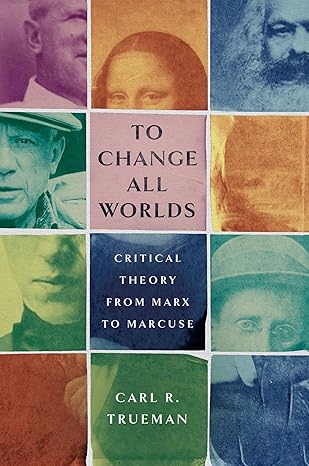A Brief Book Notice from Books At a Glance
To Change All Worlds: Critical Theory from Marx to Marcuse is Carl Trueman’s latest work on the subject. It’s an accessible introduction to the history and development of critical theory, highlighting the major players: Hegel, Marx, Korsch, Lukács, the Frankfurt School, Wilhelm Reich, and Herbert Marcuse. Trueman examines these key figures, positions them within their historical context, and traces the development of their destructive yet influential theories.
Christians, and Christian leaders in particular, simply must gain an understanding of this subject that has come to dominate our culture.
Highly recommended!
Table of Contents
1 The Importance of Critical Theory
2 Hegel, Marx, and the Origins of Critical Theory
3 The Crucible of the Critical Imagination: Karl Korsch and Georg Lukács
4 The Frankfurt School: From Traditional Theory to Critical Theory
5 The Problems of Enlightenment
6 Critical Theory and Sexual Revolution: Wilhelm Reich and Herbert Marcuse
7 The Culture Industry
8 Negating the Spirit That Negates
Selected Quotes
- “But the main problem with critical theory, at least of the stream discussed in this volume, is its anthropology, its understanding of human nature.” (5)
- “A knowledge of the origins of critical theory is very useful, perhaps even vital, for an accurate understanding both of the inner logic, public significance, and political ambitions of the critical theorists of today.” (16)
- “As with later critical theorists, Marx is asking a critical question: what social conditions lead to the definitions of what counts as truth and knowledge at any given point in time?” (28)
- “At the heart of the social problem to which critical theory addresses itself is the dialectical relationship between the individual and society as a whole.” (96)
- “This is where the truly radical—the truly critical—nature of critical theory becomes significant. Critical theory does not seek to critique the contemporary system with a view to improving it. It seeks to critique the contemporary system with a view to overthrowing it entirely. And the radical nature of this cannot be overestimated.” (100-101).
- “In other words, revolution requires a culture fully committed to making the sexual nature of human beings obvious and destroying any notion that sex in itself possesses an intrinsic moral shape to which human beings must conform in order to be truly human. Again, to impose a moral shape on sexual desire is to impose a normative notion of what it means to be a human being.” (164)
- “Of all the areas covered by the early Frankfurt School, the material on the cultural industry is perhaps the most useful to Christians. In our highly technologized and entertainment-saturated world, it alerts us to the many ways in which our imaginations are formed. It is not simply—or even primarily—arguments that shape our thinking. The aesthetics and the forms of cultural discourse are also significant.” (208)
- “This is where the church can refute critical theory. If we take the Marxist notion, that humanity is something to be realized in the future, where the terms of being a free individual and belonging to a community will be overcome, then the church makes the claim that that is already realized in the here and now in the church itself.” (225)
Related Titles
See Trueman’s related titles:
